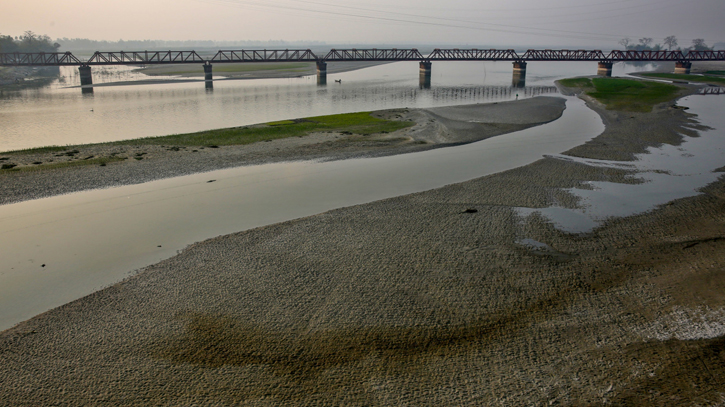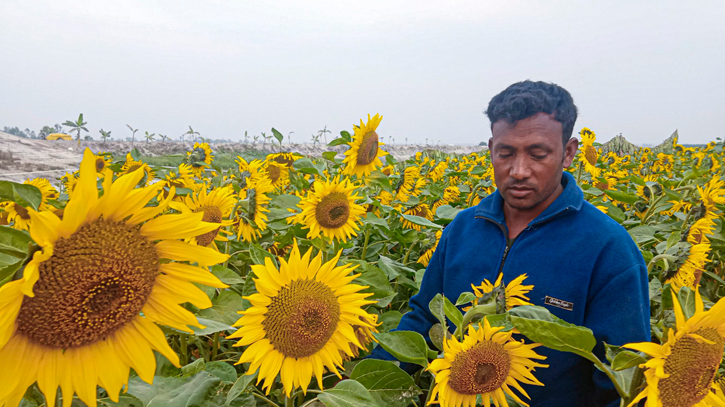
In 1989, my father, Dr Md Sarwarul Haque, joined the Department of Agriculture Extension (DAE), where he spent the next 32 years working on various agricultural projects across Bangladesh.
From 2018 to 2020, he served as the deputy director in the Rangpur district, during which, I had the opportunity to observe his involvement in a range of initiatives focused on agricultural adaptation.
My father was involved in a number of agricultural projects throughout his career, including the four-crop-based cropping pattern initiative introduced by the Bangladesh Agriculture Research Institute in Tepamadhupur Union, Kaunia. He also helped implement a safe garlic production project in the char lands of Gangachara upazila, contributing to climate-smart agricultural practices in floodplain areas.
Additionally, he played a role in the establishment of the "Climate Change Adaptation of Rural Households in Charland of Bangladesh" project in the Chargonai union of Kaunia, which aimed to increase agricultural employment in rural households through the cultivation of high-value seed nuts.
As a soil specialist, my father was particularly concerned about soil degradation caused by the heavy use of chemical fertilisers, which was a significant issue in the char lands. These areas, being sandy and less fertile, required large amounts of fertiliser for agricultural production.
To address this, he introduced vermicomposting as a way for farmers to produce organic fertiliser in their yards, helping reduce soil degradation caused by chemical inputs.
Growing up, I observed my father's commitment to supporting farmers and improving their living conditions. However, when I began studying environmental science, my attention turned to the shifting patterns of the Teesta River.
Being from Rangpur, I had always wondered why the river seemed to be growing so large and how it impacted the local community. This curiosity led me to propose a research project on the climate vulnerability and adaptation strategies of the Teesta floodplain.
After framing a proposal, I was fortunate enough to receive a research grant, which encouraged me to dive deeper into the subject. On June 27 this year, I started collecting data in the Teesta floodplain with my research assistant, Mehedy Hasan Shaon. Over the next ten days, we observed various agricultural adaptation strategies in some of the most vulnerable areas of Kaunia.
During a focus group discussion with senior farmers, I learned that agricultural production had improved in the last 5-6 years due to solar irrigation, better seed quality, and new technologies. However, it was my father's sweet pumpkin project that seemed to have had a major impact, with farmers now planning to expand their vegetable cultivation in the char lands. It was meaningful for me when one of the farmer leaders, Shadhin Mia, mentioned my father's contributions by name, highlighting the enduring effects of his work.
 During my visit, I also saw many women from agricultural families preparing nuts in their yards, a reflection of another project my father had initiated – Climate Change Adaptation of Rural Households in Charland of Bangladesh. The adoption of new cropping patterns and the widespread use of vermicomposting in the community showed the positive outcomes of these initiatives.
During my visit, I also saw many women from agricultural families preparing nuts in their yards, a reflection of another project my father had initiated – Climate Change Adaptation of Rural Households in Charland of Bangladesh. The adoption of new cropping patterns and the widespread use of vermicomposting in the community showed the positive outcomes of these initiatives.
The primary goal of my research is to assess the vulnerability of agricultural communities and to understand how they are adapting to climate change and the uncertainties related to transboundary water disputes. My field observations confirmed that while the shifting of the Teesta River poses challenges to the community, the adaptation strategies being implemented offer hope.
Although there are still gaps, I believe that with cooperation from all stakeholders, it is possible to create a more resilient and sustainable environment for the community. Now, at 62, my father is preparing for retirement, and I have begun my journey in the development sector. Reflecting on his contributions to climate-adaptive agriculture, I feel a strong sense of responsibility to continue the work he started.
As his next generation, I see it as my responsibility to contribute to a more sustainable future. I believe that the concept of intergenerational responsibility is crucial to global sustainability. I hope that parents can raise their children with this mindset, fostering a collective responsibility for creating a better future for all.








